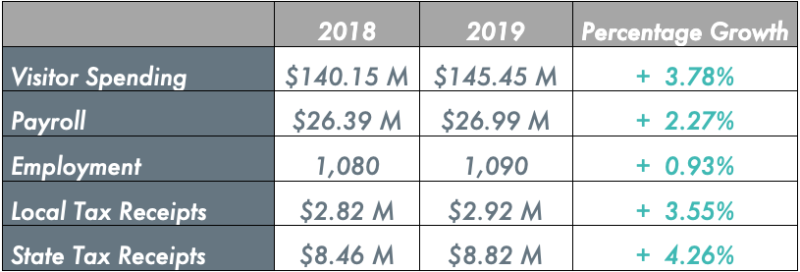
Report shows tourism is vital to restoring state’s economic recovery
COOKEVILLE – The Cookeville-Putnam County Visitors’ Bureau joins Gov. Bill Lee and the Tennessee Department of Tourist Development in announcing Tennessee tourism’s latest economic impact numbers as recently released by U.S. Travel Association. Direct domestic and international travel spending hit a record high of $23 billion in 2019, marking a decade of consecutive growth.
Maintaining its rank of 16th of Tennessee’s 95 counties, Putnam County’s contribution to that growth resulted in $145.45 million in visitor spending, an increase of 3.78%. This sustained momentum in visitation to Putnam County generated $2.92 million in local taxes, an increase of 3.55% over the previous year and $8.82 million in state taxes, up 4.26%.
These tax revenue increases demonstrate the value of tourism in Putnam County, resulting in an annual tax relief to local residents. If not for visitor spending, each Putnam County household would pay $377.97 more in taxes each year.
Tennessee tourism was on a record track in the first three months of 2020 before COVID-19. The Coronavirus pandemic is the largest crisis to hit the travel, leisure and hospitality industries in history, shutting down almost all travel activities and threatening the security of businesses and employees the industry supports.
“Tennessee is a world-renowned destination, and I look forward to the time when we can gather together again at our festivals, sporting events and more,” said Gov. Bill Lee. “Tourism is our state’s second largest industry. Coming off another record year, this data underscores the tremendous positive tourism impact on our state’s revenue. As we’ve seen now more than ever, travel and tourism are vital to restoring economic health and recovery in Tennessee.”
In 2019, Tennessee outpaced the nation in all areas of travel; including tax revenue, expenditures, payroll and employment. The leisure and hospitality industry produced more jobs than any other industry. Last year, travelers in Tennessee spent an estimated $64 million per day. Tourism generated over $75 million in new state and local tax dollars in 2019, approximately half of which directly supports public education. Those tax dollars also support public safety, health and human services, business and economic development. Travel in Tennessee generated 195,000 jobs and $1.92 billion in state and local tax revenue.
These numbers reflect tourism’s significant impact prior to the ongoing COVID-19 crisis. U.S. Travel Association predicts the travel economy in Tennessee could see a 35-45% decline in 2020 from 2019.
“With our businesses taking the Tennessee Pledge, our restaurants, businesses and attractions are ready for safe travel,” said Commissioner Mark Ezell, Tennessee Department of Tourist Development. “I encourage travelers to safely explore, support local businesses and attractions, create family memories, discover outdoor scenic beauty where social distancing is a natural, take road trips, explore rural destinations and hidden gems that drive visitation. Our goal is to become the best non-beach tourism state in America. We’re constantly exploring new opportunities to inspire growth across the state, drive jobs and economic growth, including in rural, at-risk and distressed counties.”
“As we see our impact rise each year, it’s obvious tourism is a major economic driver for not only Putnam County, but for our entire region,” said Executive Director Molly Brown, Cookeville-Putnam County Visitors’ Bureau. “We continue to encourage our hospitality partners to abide by the guidelines of the Tennessee Pledge; wear masks, social distance, work to ensure that travelers to our destination feel this is a safe destination to visit and invest in our community’s economy.”

To view the full report, click here.
The Cookeville-Putnam County Visitors’ Bureau serves as the designated destination marketing organization (DMO) for Putnam County with the objective of inspiring travel and overnight stays resulting in increased sales and lodging tax revenues for the purpose of providing a tax relief for local residents.








